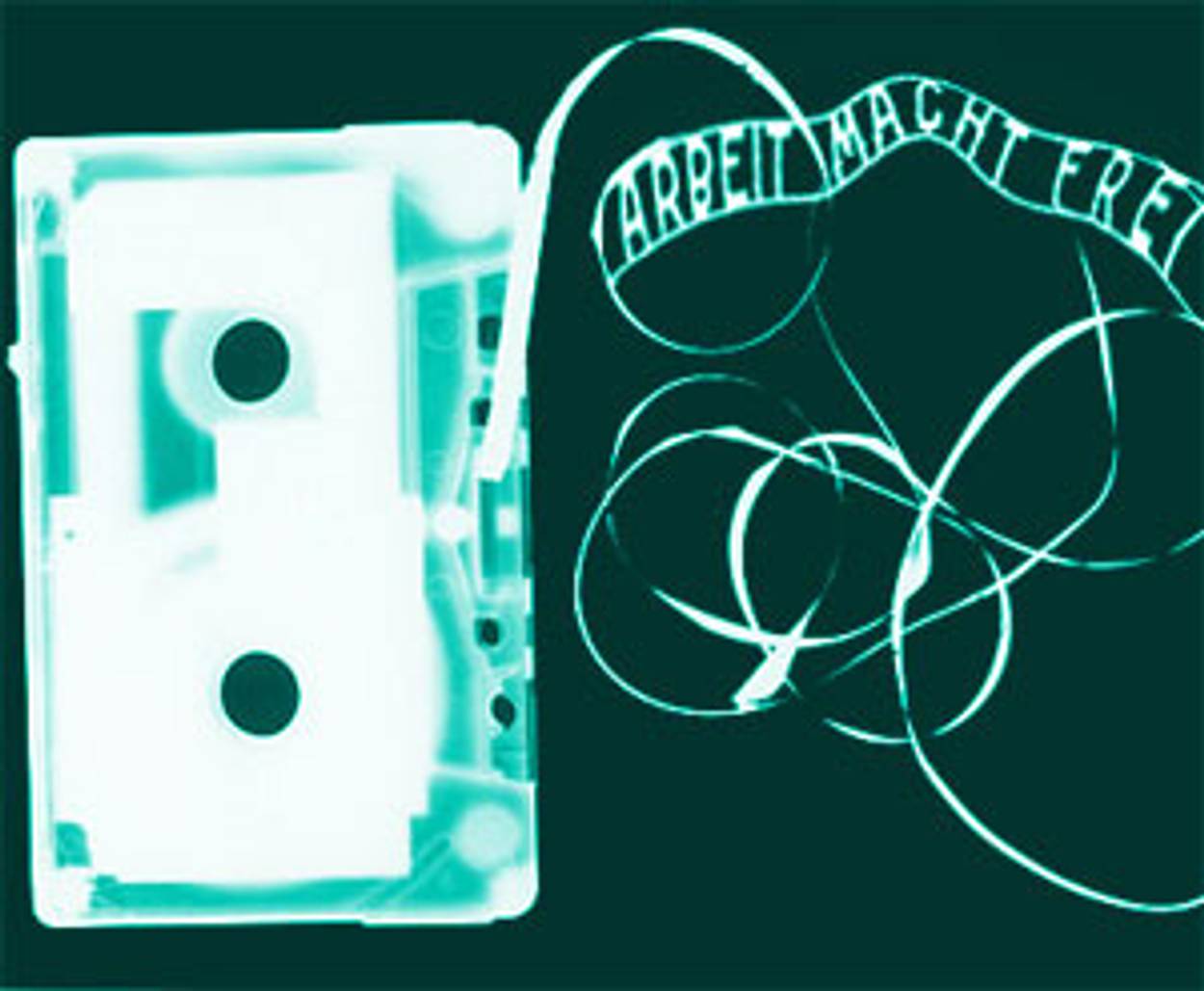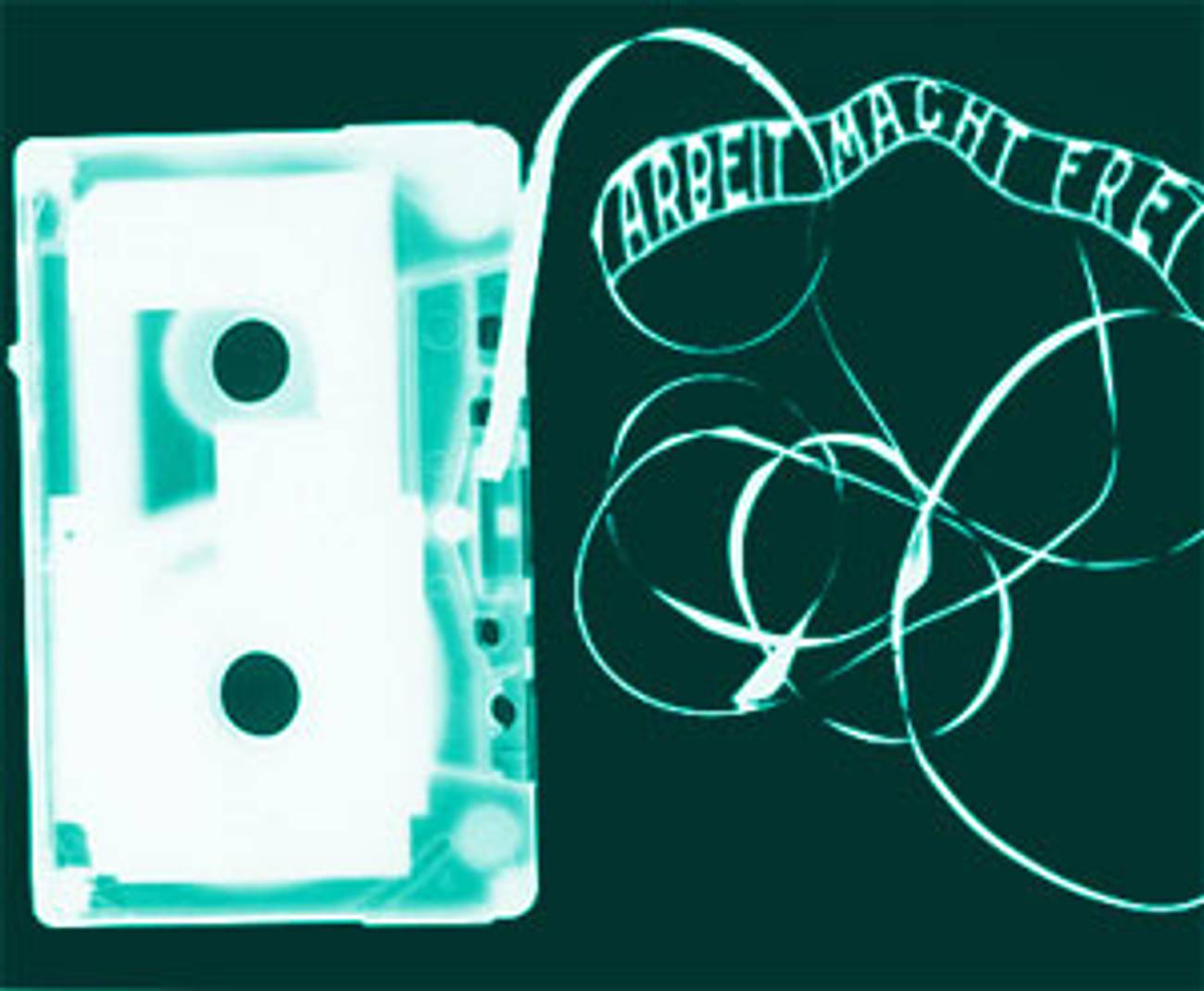Rock and a Hard Place
Sex, drugs, and . . . the Holocaust?




For forty-odd years, people have been writing hit rock songs about war (“Fortunate Son,” by Creedence Clearwater Revival, “Ohio,” by Crosby, Stills, Nash & Young, “War Pigs” by Black Sabbath), although they often sound most at home when they’re singing about youth, love, America, sex, driving, revolution, and not knowing what they want to do after college, because those subjects beget cries to action—let’s do something, now! But as a subject, the Holocaust is pretty resistant to rock; it’s over and its victims never stood a chance. The subject presents scant opportunity for fist-pumping. Nonetheless, a surprisingly large number of bands, which is to say a handful, have written songs about it.
Many of the examples fall into two groups: bands who implicitly acknowledge the apparent absurdity of their undertaking, and those brave souls who just go for it. From the latter group, there is “This Train Revised,” from the Indigo Girls’ 1994 album Swamp Ophelia. Right away, rapid strumming and minor-interval vocal harmonies suggest righteous grievance, and as soon as you hear the first, crisply enunciated lyrics—“Piss and blood in a railroad car/ Gypsies, queers and David’s star”—you understand that this a protest song. By invoking the spiritual “This Train (Is Bound for Glory),” which was sung on civil rights marches in the 1960s, the Indigo Girls cast Holocaust victims as martyrs in an ongoing struggle for justice. The problem is that the civilians that were put on those trains weren’t fighters for a cause; they weren’t picking a fight of any kind, and this is part of the Holocaust’s distinctive horror. The militant tone of the song feels like an evasion of that uncomfortable truth.
But detachment and irony have their perils as well; take the Sex Pistols’ 1977 song “Belsen Was a Gas,” written by Sid Vicious. Like the swastika T-shirt that Vicious famously sported around London, the song is more of a comedy bit than a provocation to thought. In its verses, Bergen-Belsen’s inmates talk about what a good time they’re having, and then Vicious encourages the listener to commit suicide. It might be possible to pull off a Holocaust joke, but this one fails because it’s ultimately self-aggrandizing; Vicious is more interested in showcasing his capacity for irreverence than in saying anything specific about Bergen-Belsen or the way it’s remembered.
The best results seem to come from those who acknowledge the weirdness of singing about the Holocaust while doing it earnestly anyway. An early example of this approach is “Dachau Blues,” from Captain Beefheart and His Magic Band’s 1969 album Trout Mask Replica. It helps that Beefheart keeps his lyrics oblique: “Sweet little children with doves on their shoulders / Eyes rolled back in ecstasy / . . . They’re counting out the devil with two fingers on their hands.” More important, “Dachau Blues” isn’t a blues that B.B. King would readily acknowledge; Beefheart’s noise-jazz assemblage sounds like it’s trying methodically to get a blues started over and over again but can’t bring itself to do it; the means of expression just can’t be made to fit the subject. This helplessness feels right.
Beefheart’s approach might have informed Neutral Milk Hotel’s 1998 album In the Aeroplane Over the Sea. Composed by singer-songwriter Jeff Magnum after reading The Diary of Anne Frank, it’s a literary album, allusive and haunting. In the decade since its quiet release, it’s taken on considerable prestige—indie rock’s great canonizer, Pitchfork, gives it a perfect 10.0, and Jonathan Safran Foer is rumored to be a fan. Its lyrics often describe conversations between the living and the dead; the music, full of saws, horns, and echo effects, old-fashioned and avant-garde elements, is part of those conversations. One of its slightly creepy achievements is the way it’s able to subtly eroticize the Holocaust’s mix of victimhood, premature death, urgency, flight, and ghosts in much the same way as young-adult Holocaust novels like The Devil’s Arithmetic. On the title track, Magnum does this beautifully:
There are lights in the clouds
Anne’s ghost all around
Hear her voice as it’s rolling and ringing through me
Soft and sweet
How the notes all bend and reach above the trees.
Most of the songs on Aeroplane that touch on the Holocaust are laments, using metaphors like a two-headed boy trapped in a jar and subject to questionable medical scrutiny (“they’ll be putting fingers through the notches of your spine,” on “Two-Headed Boy, Part I.”) But halfway through the album, Magnum underscores the irony of making rock ’n’ roll about large-scale inhumanity by opening a song ominously titled “Holland, 1945” with a cheerful “one, two, one-two-three-four,” then plunging into a fast power-chord progression. It sounds like a pop-punk song about a crush, and it is. Magnum’s brilliance lies in his willingness to let it be a crush song, not a dirge, even though the crush’s object is a fifteen-year-old murdered by the state:
The only girl I ever loved
Was born with roses in her eyes
But then they buried her alive . . .
Now she’s a little boy in Spain
Playing pianos full of flame.
By avoiding any literal retelling of the Anne Frank story and reducing it to a thwarted teenage romance, Magnum is able to make it raw and strange again.
In the Aeroplane Over the Sea is unquestionably the most widely acclaimed Holocaust rock effort; Slayer’s “Angel of Death,” a song about Joseph Mengele from the band’s 1986 album Reign in Blood, is the one that provoked the deepest critical disdain upon its release. This is understandable. While Neutral Milk Hotel is interested in empathizing with the Holocaust’s victims and making sense of a world in which innocents are slaughtered, Slayer is mostly interested in imagining the perspective of the perpetrators. While Captain Beefheart and His Magic Band call attention to their own inability to find a comfortable musical form for the Holocaust, Slayer claims the mindstate of a Nazi as the ultimate heavy metal subject matter. And where other bands are suggestive, Slayer is explicit:
Pumped with fluid, inside your brain
Pressure in your skull begins pushing through your eyes
Sewn together, joining heads
Just a matter of time
Til you rip yourselves apart
The lyrics enumerate Mengele’s activities without much illuminating them. But the music, both technically impressive and inadvertently hilarious, is a window into Mengele’s soul, or at least Mengele’s soul as it appeared, in a moment of inspiration, to the members of Slayer. It’s the sound of a band that takes itself absolutely seriously cranking up its speed to maximum. The two rhythm guitar tracks that open the song, and the drum solo that brings it to its climax, are mechanistic and repetitive, but not in the detached, cheerful manner of techno songs; the musicians sound like humans turning themselves into an industrial system. The statistics about the number of deaths at Auschwitz sung in the opening verse are echoed by the incomprehensible speed and repetitiveness of the guitars.
Of course, velocity and repetition are the two most important weapons in the small but time-tested heavy metal arsenal; there’s always been more than a little bit of Futurism in metal, and metal musicians have a tendency to position themselves as supermen. Nevertheless, few seem to really want to explore the Nazis in depth; most mention them in passing if at all. Since “Angel of Death” there have been numerous references to the Holocaust in metal and rap in which “Holocaust” stands for the total devastation of an adversary, or evil or brutality in general. One might perpetrate a “holocaust” on a rival MC, for instance, as RZA does in his song “Holocaust (Silkworm).” The Chicago metal band Disturbed has performed a stage show wherein the singer, David Draiman, the grandson of a survivor, mimes death under a gas-shower prop during a multimedia presentation that shows iconic images of violent intolerance, like illustrations of the Salem witch trials.
But Slayer is not content to use perpetrators and victims as metaphors. They want to be inside a perpetrator’s personal experiences. I would never argue that their poetry ranks with Jeff Magnum’s, but there is some truth in those frenetic, maniacal guitar lines. The Nazis suffered from delusions of grandeur; they believed they could assume a God-like stature on the world stage. Slayer’s overwrought guitar parts evoke that delusional state. It may or may not be intentional, but “Angel of Death” captures something other than the awfulness of the Nazis. It captures their ridiculousness, and in so doing renders them a little more real.